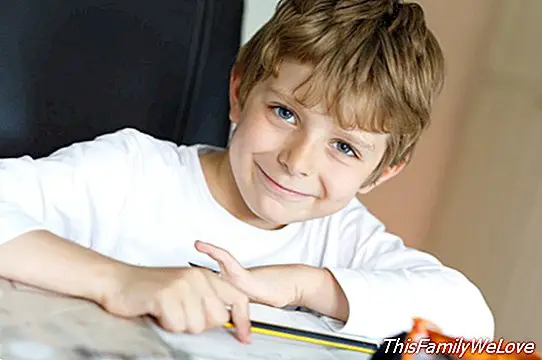Studying is not a roll: find motivation!

There are many parents who face the study of their children as a true torture. The state of discouragement or lack of interest abounds among children, and the simple act of doing homework is sometimes a struggle.
This leads us to have to ask ourselves how we are teaching. The content of what needs to be learned is clear to us, but what about the way we do it? Studies already show that the emotional component that surrounds education determines the effect that this can have on children, therefore, the way we transmit a message to the smallest brand how they will integrate and acquire.
Be motivated: the foundation of successful learning
When children are asked what their favorite subjects are, the answers usually coincide: drawing, visual arts, physical education or music. However, mathematics, language or science are not among them. Why do not these subjects arouse your interest? Is it that the former are more fun? Or is it that the latter are too "heavy"?
What we feel in each moment influences the meaning we give to each event. The emotional predisposition at the moment of perceiving an idea affects how we are going to experience it and then remember it.
This has a neuropsychological foundation, that's how our brain works. Logically for the survival of the species it would not make sense to learn what was not relevant to us, but what benefits us or is truly useful.
The impact of emotions: the limbic system
We all know what we experience when we are happy, sad, angry or fear, not only is experiencing a sensation, but we suffer a series of physical and psychological changes that change the way we are going to face the world . It is not the same to enter to do an exam with a high level of anxiety or with a great tranquility.
These emotional states are regulated by Limbic system, a set of brain structures that work coordinately in our emotional regulation. Well, among these structures there are two in particular that play an important role in learning. The first one is the Amygdala, great processor of emotions, the great hazard detector. On the other hand, there is the Hippocampus, the person in charge of memory, where our memories are going to be stored and then evoke them.
The Amygdala and the Hippocampus, together with the rest of the structures of the Limbic System, send messages to the rest of our body through the vegetative regulation of the body and behavior to identify if that "interests" or "does not interest", if that is " good "for us or it is not. In this way we will show an attitude of openness towards that event or we will close ourselves and not let it enter.
On the other hand, this Limbic System plays another great role. It has direct connection with the Prefrontal lobe, the person in charge of the finest attention, impulse control and concentration, which logically are absolutely necessary skills to learn.
Hence, knowing that the emotional state has such significant repercussions in the processes of memory and attention, we must consider whether our way of educating is containing this dimension.
2 keys to learning: confidence and curiosity
The trust it is the basis of an optimal emotional state for learning. Trust is the security that one has in oneself when facing events. The learning does not stop being a reception of information and new situations to solve, in which you have to use the previously learned but at the same time acquire a skill, dexterity, new knowledge to advance.
If a child does not have confidence in himself, it is very difficult for him to be aware of all his aptitudes and abilities, he will be helpless and insecure. We often meet children whose first answer is "I can not".
Do we educate in confidence? Do we send positive messages which imply that the child is capable of everything that comes his way? How do we react to mistakes?
Remember that trust is the security kick we give our son, it is that message that conveys that you can achieve your achievements, not for free, but as a result of effort, dedication and delivery.
It is also know how to react to failures or "failures", looking for an alternative, without lashing for them but without missing the opportunity to take the learning they contain.
Confidence in them is born of the confidence that you, as a father or mother, transmits to them. To trust is not to know that you will be able to do everything and well, but to know that you will be able to learn from failures and successes in an appropriate way.
Curiosity: the motor for the action. Another fateful part of education is the lack of illusion.Children are overloaded with tasks that are not interesting in the end, because they do not promote proactive thinking, but simply learn it and take it all out in the exam.
Therefore it is essential to teach in curiosity, in the desire to be the protagonist of their learning. If you know that your child is studying the flora of the community in social sciences can be an ideal time to take a field trip on Sunday, where he can experience those contents that appear so alien and abstract books. If in Spanish we have to study Spanish literature, it is a good opportunity to take the forgotten poetry book off the shelf and read it at some point after dinner.
Making your son or daughter an active agent, who wants and enjoys learning, seems difficult but it is much simpler than it seems. It is a moment of union of the family and a bond that accompanies you in the fundamental way that is the learning of your child.
Belén de Toro Mingo. Neuropsychologist Infantojuvenil de Psicólogos Pozuelo




